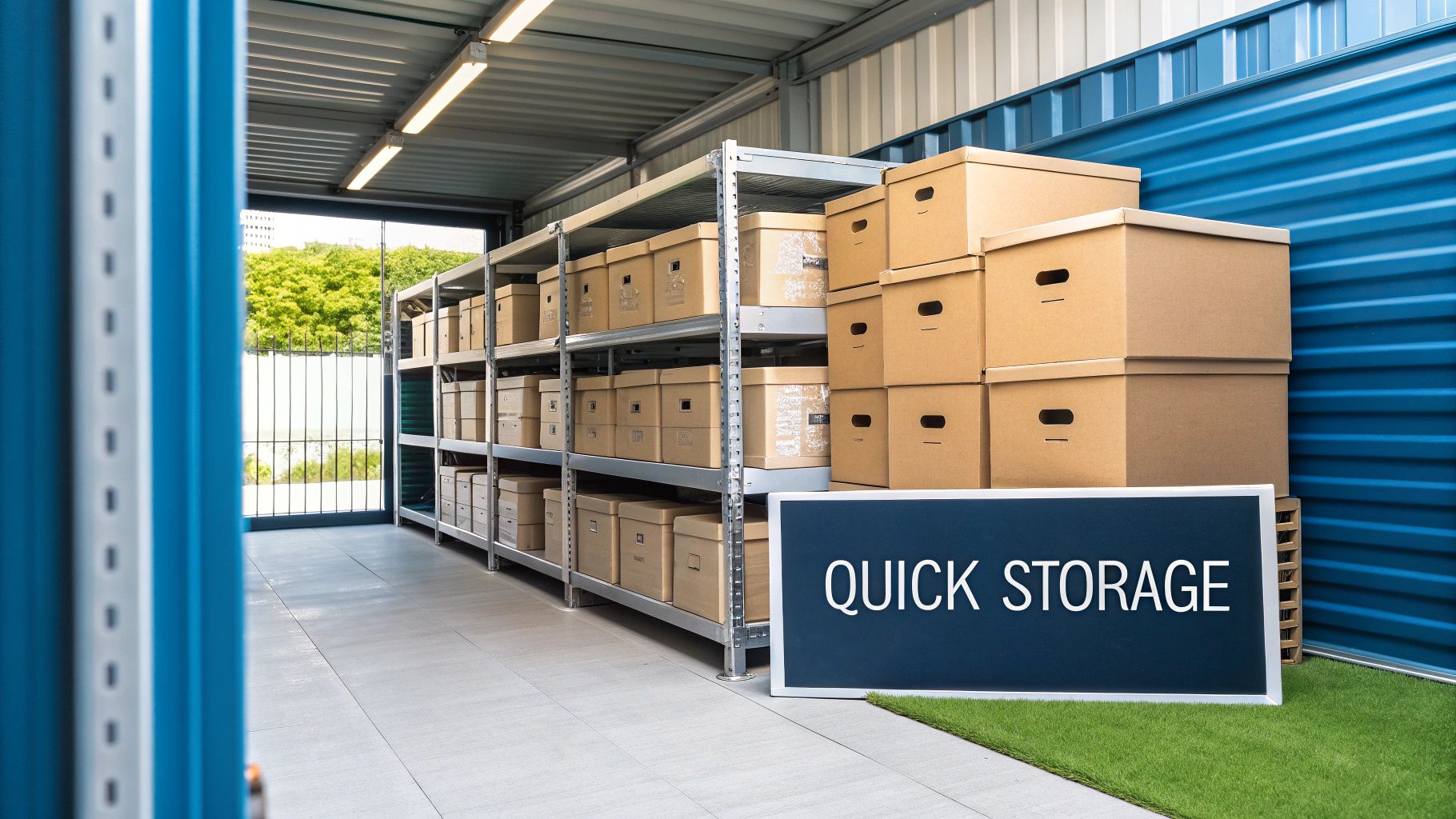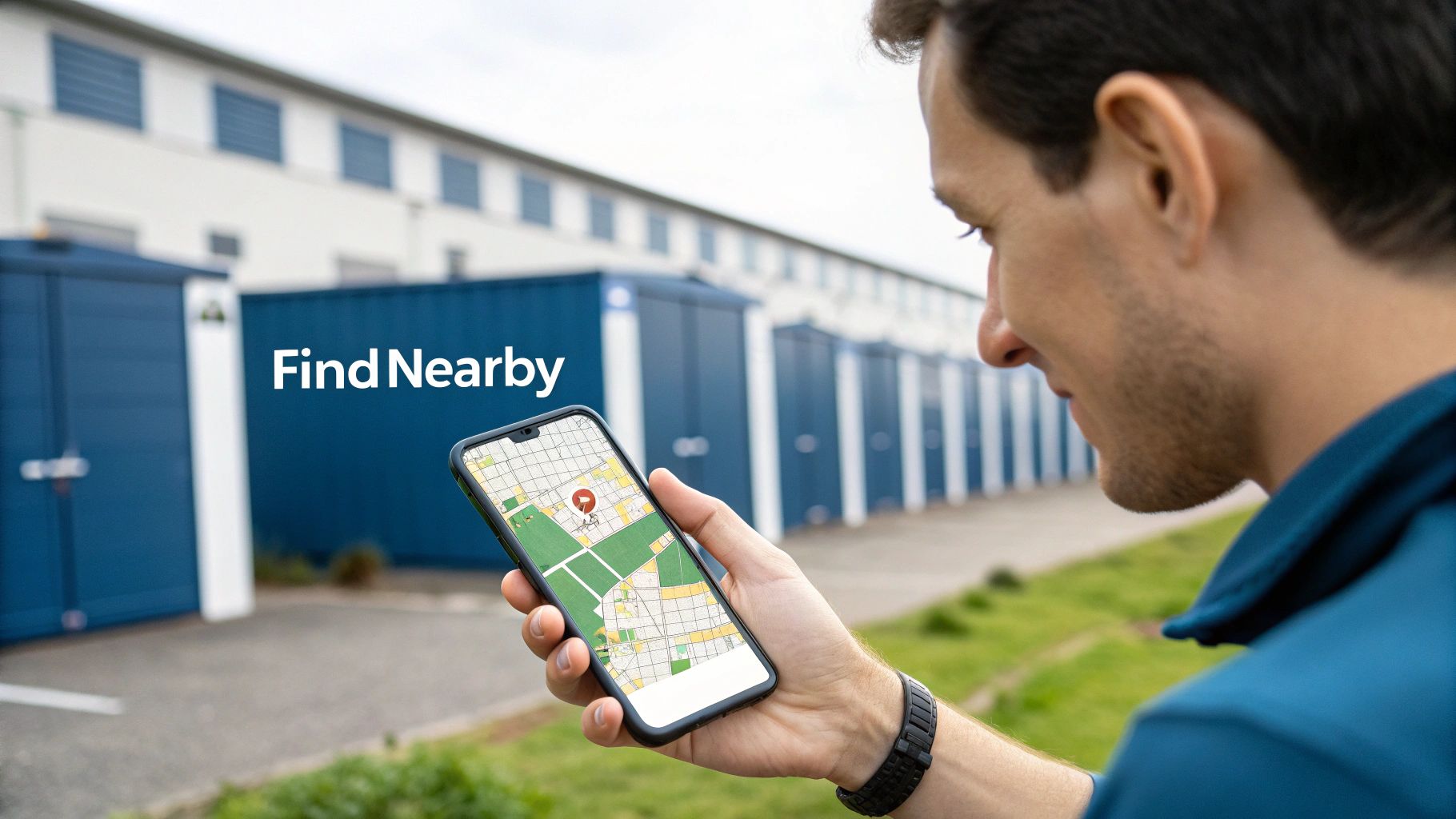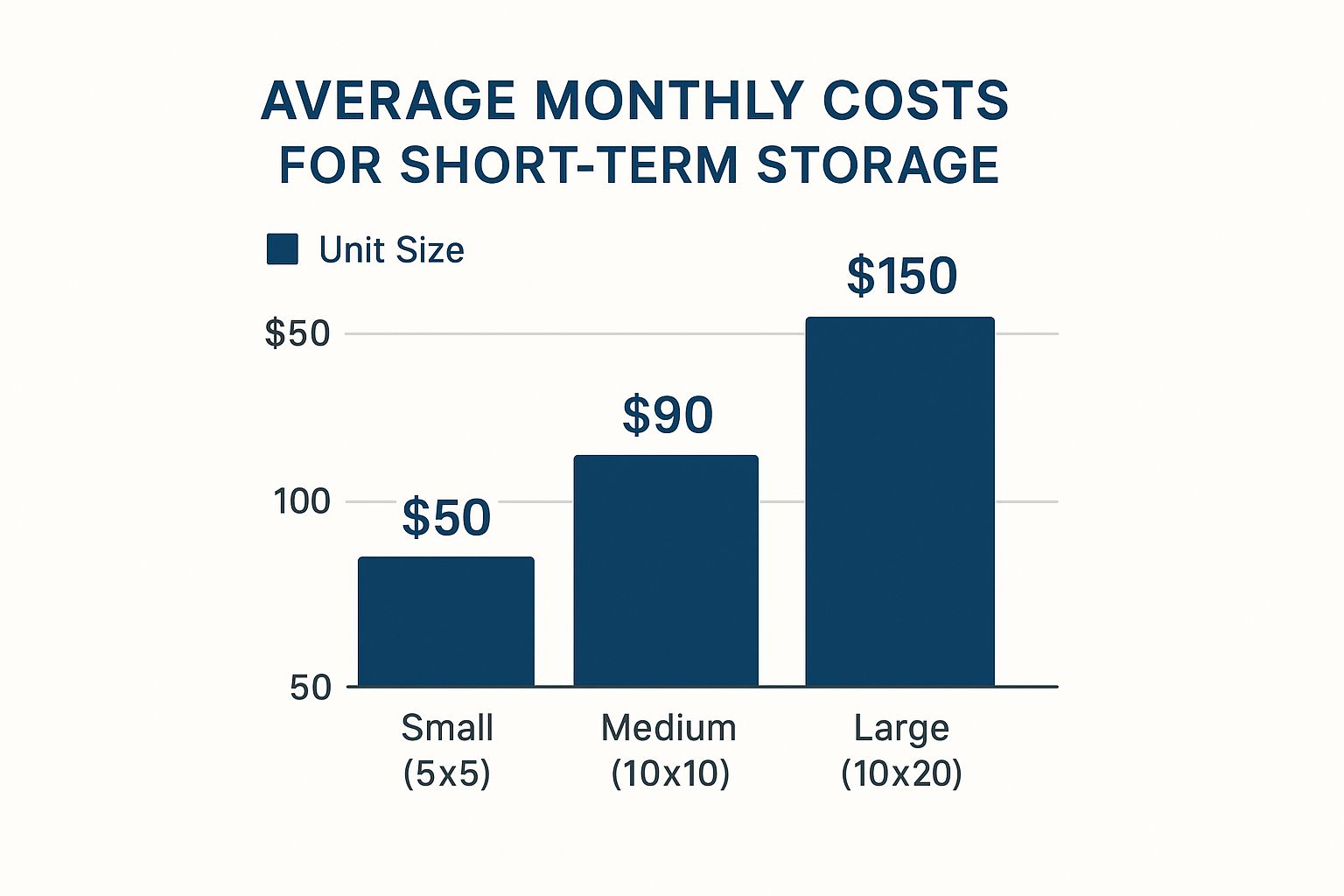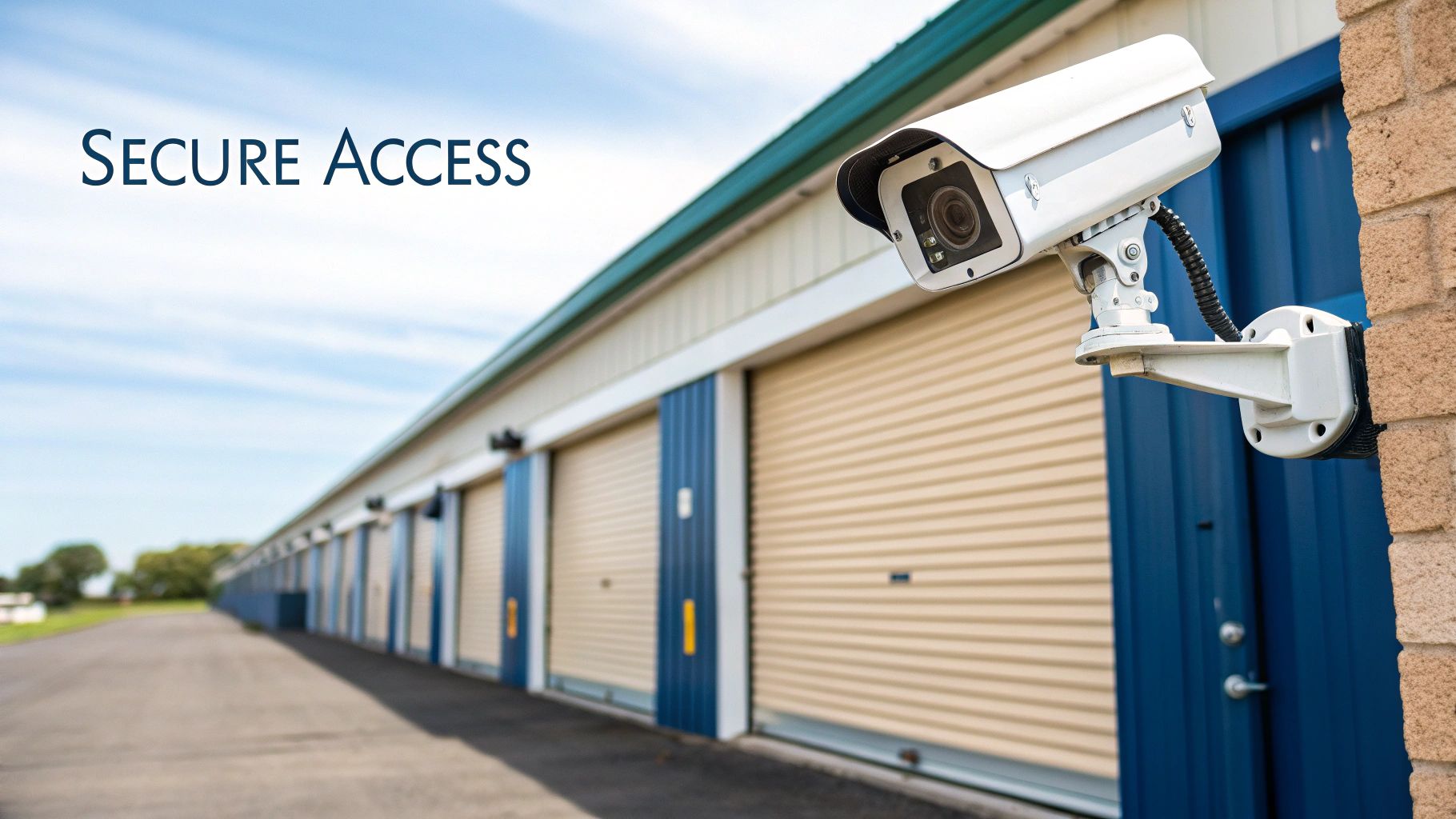That search for "short term storage near me" usually happens when life is in flux. You need a flexible, secure spot for your belongings for a few weeks or maybe a couple of months – a temporary home for your things while you navigate a big change.
When Do You Really Need Short Term Storage?



Life rarely sticks to a neat schedule, and the need for a bit of extra space can pop up without much warning. Whether you're caught in the middle of a complicated house move or just trying to reclaim your spare room, temporary storage offers a straightforward, practical fix. It’s the perfect stop-gap solution, keeping your possessions safe and sound when you need them out of the way.
Take the classic moving day drama. Delays happen all the time, and it's not uncommon to find yourself with a gap between moving out of your old place and getting the keys to the new one. A short-term unit becomes a lifesaver, providing a secure holding bay for your entire household and taking a huge amount of stress off your shoulders.
Common Scenarios for Temporary Storage
The UK storage market has become incredibly good at solving these kinds of immediate problems. You might only need a unit for a few weeks to handle situations like these:
- Home Renovations: It's the smart way to protect your furniture and valuables from dust, paint, and general chaos while you're decorating or extending. No one wants accidental paint splatters on a new sofa.
- Decluttering to Sell: Estate agents will almost always tell you to clear out clutter. Storing excess belongings helps potential buyers see the actual space, making your home look bigger and more attractive. It can genuinely speed up a sale.
- Student Storage: Why lug everything back home for the summer? Students can use a small, affordable local unit to store their things between terms, saving a lot of hassle.
- Business Needs: Small businesses often rely on short-term storage for holding seasonal stock, archiving old documents, or stashing tools and equipment between jobs.
The most important feature here is flexibility. The best short-term storage solutions won't try to tie you into a long, restrictive contract. They’re designed to fit around your life, giving you the security and convenience you need, for exactly as long as you need it. This adaptability is what makes it such a vital resource for so many people and businesses across the UK.
How to Find the Best Local Storage Options



Most people start their search for storage with a quick online search, but just typing "short term storage near me" often gives you an overwhelming and not-so-helpful list. The trick is to be a bit more specific right from the start.
Try refining your search terms to include exactly what you need. For instance, something like "flexible self storage near [your postcode]" or "temporary container storage [your town]" will help tools like Google Maps and local directories zero in on the most relevant options in your immediate area. It's a simple tweak that saves a lot of time.
The self storage industry here in the UK has grown massively, with an annual turnover now sitting at around £1.2 billion. With over 2,900 sites across the country, you’ve certainly got choices. It's interesting to note that container storage now accounts for nearly 40% of the market, particularly in more rural spots where land is cheaper. This variety is great news for anyone looking for a local solution.
Tap into Community Knowledge
Search engines are a great starting point, but nothing beats a genuine recommendation from someone who's been there. Local social media groups and neighbourhood forums are goldmines for honest, unfiltered feedback.
Don't be shy about asking for personal experiences or searching for past discussions about storage facilities. You’ll get the real scoop on things you won't find in an advert, like how good the customer service actually is or whether the access hours are as convenient as they claim. These firsthand accounts can help you steer clear of any duds. If you want a better sense of what a top-notch facility offers, it's worth understanding the many benefits of self storage.
Create Your Shortlist
Once you've done a bit of digging, it's time to narrow down your options. I always recommend creating a shortlist of three or four promising facilities.
Here’s what to focus on when you’re whittling down the list:
- Proximity: Is it actually convenient to get to from your home or workplace? A short drive is a huge plus, especially if you think you’ll be popping back and forth.
- Access Hours: Make sure their opening times work for your schedule. Evening or weekend access can be a lifesaver for short-term lets when you're busy.
- Initial Feedback: What’s the general vibe from online reviews and community comments? A clear pattern of praise—or complaints—is usually a reliable sign.
With a solid shortlist in hand, you’re moving from aimless browsing to actively evaluating your best options. This focused approach makes finding the right space for your belongings a much smoother process.
What to Look for When Comparing Facilities
You've got a shortlist of local storage places. Great. Now comes the real work: looking past the shiny adverts and headline prices to find what truly offers the best value. It's about comparing the things that genuinely matter for your peace of mind and your wallet.
Security, Access, and the True Cost
First things first, let's talk security. Don't just tick a box because their website says "CCTV". You need to dig a little deeper. I always advise asking specific questions: Is the whole site covered by cameras, or just the front gate? Do the individual units have alarms? Is there actually a person on-site during opening hours? A layered approach to security is what you're really looking for.
Next up is access. Some places give you 24/7 access, which is fantastic if you're running a business or just have a chaotic schedule. Others have more limited hours, which might be perfectly fine if you're just stashing away Christmas decorations. Think honestly about when you'll need to get to your things and find a facility that matches that rhythm.
Now, for the big one: the actual cost. That tempting weekly price you see advertised is almost never the full story.
To get a proper sense of the final bill, you need to ask about:
- Deposits: Is one needed? And what are the exact conditions for getting it back in full?
- Insurance: Most facilities insist on it. Find out if you have to buy their policy or if your own home contents insurance will cover it. This can make a big difference.
- Hidden Fees: Be direct. Ask about any admin fees, charges for buying their specific lock, or what the penalties are for a late payment.
It's only by uncovering these extra charges that you can make a genuine apples-with-apples comparison. I've seen seemingly cheap options quickly become the most expensive once all the extras are piled on.
Sizing Up the Price and Commercial Use
The price you pay is obviously tied to the size of the unit. Getting this right from the start is key to not overspending on space you simply don't need.
This quick guide shows the typical monthly costs you can expect for popular unit sizes here in the UK.



As you can see, the price jumps significantly as you go up in size, so it pays to measure twice and rent once.
It's also worth knowing what kind of storage you're after, as the options vary.
Comparing Short Term Storage Types
Here's a quick comparison of the main types of short-term storage available in the UK. It should help you decide which option is the right fit based on what you value most.
| Feature | Indoor Unit | Outdoor Container | Mobile Storage |
|---|---|---|---|
| Climate Control | Often available; best for sensitive items | Not typically available | Varies; usually not climate-controlled |
| Accessibility | Limited to facility hours; internal corridors | Often 24/7 drive-up access | You control access at your location |
| Security | Multi-layered (gate, building, unit lock) | Gated access, CCTV, individual lock | Depends on where you keep the container |
| Best For | Furniture, electronics, documents | Tools, vehicles, large equipment | On-site needs during renovations |
Ultimately, the best choice depends on what you're storing and how often you'll need to get to it.
Finally, don't forget the rise of commercial use. It’s a huge part of the market now. The latest industry report from Cushman & Wakefield shows that around 24% of users run a business from their units. This trend has pushed average rental returns up by 6% to £29.13 per square foot, showing just how valuable this flexible space has become. Because of this demand, many facilities now offer specific business storage units with features like delivery acceptance and better access, which might be exactly what you need.
Choosing the Right Size Unit to Avoid Overpaying
It’s one of the easiest mistakes to make: renting a storage unit that’s far too big for your needs. We've all been there, staring at a half-empty space and wondering where we went wrong. A little bit of planning upfront can save you a surprising amount of money in the long run.
Visualising space is notoriously tricky, so it helps to think in terms of familiar comparisons. For instance, a 50 sq ft unit is about the size of a large garden shed. That’s usually enough to hold everything from a one-bedroom flat, including the sofa, bed, and a good number of boxes.
If you just need to clear out a student room or finally declutter that spare bedroom, a 25 sq ft unit is a great fit. Think of it as a generous walk-in wardrobe.
Estimating Your Space Accurately
Before you book anything, take a few minutes to get a clear idea of what you actually need to store. The best way to start is with a quick inventory list.
Jot down all your larger items—furniture, appliances, big boxes—and their rough dimensions. This simple exercise alone will give you a much better feel for the space required. For an even more precise figure, you can use our handy self storage calculator to get a personalised recommendation based on your inventory.
Don’t just guess your space requirements. Taking ten minutes to create an inventory or use an online calculator can prevent you from paying for empty space you'll never use, potentially saving you hundreds of pounds over your rental period.
Understanding Pricing and Finding Value
When you search for "short term storage near me," you’ll be flooded with introductory offers. While these deals can be fantastic, always read the small print. Many are only for the first four weeks, after which the price can jump up significantly.
Also, check the billing cycle. It’s common for facilities to bill every four weeks, not monthly. This means you’ll make 13 payments a year, not 12, which can make a real difference to your budget.
With the UK having just 0.94 square feet of storage space per person, the market is tight. As it continues to grow, clear and competitive pricing will become even more crucial. You can find more insights in the UK self storage industry report on januseurope.com.
Finalising the Paperwork and Gearing Up for Move-In Day



You’ve found the perfect storage space, and now it’s time to make it official. Getting the rental sorted for your short-term storage is usually quite straightforward, but being prepared makes everything run that much smoother.
There's always a bit of paperwork to get through. You'll need to read over and sign the rental agreement, which details everything from your payment dates to the facility's rules. Most places will ask for some photo ID, like a driving licence or passport, plus a recent utility bill as proof of address.
Preparing for the Big Move
With the formalities out of the way, your focus can shift to actually moving your things. A little organisation at this stage is the key to a stress-free day and, more importantly, makes it far easier to find what you need later on.
A well-organised unit always starts with good packing. Here are a few tried-and-tested tips to get you started:
- Uniform Boxes: Try to use boxes of a similar size. They stack so much better, which lets you make the most of the unit’s height without creating a wobbly tower.
- The Right Supplies: Invest in good quality packing tape (the cheap stuff is a false economy!), bubble wrap for anything delicate, and some dust covers or old sheets for your furniture.
- Label Everything: This is non-negotiable. Label every single box on at least two sides with a clear description of what's inside. You'll thank yourself later when you're not tearing through ten boxes to find one specific item.
A quick pro tip: Pack your heaviest items into smaller boxes so they’re easier to lift, and always place them at the bottom of any stack. This simple trick stops your lighter boxes from getting squashed and keeps everything stable.
How you load the unit is just as important as how you pack. Start by placing your large, bulky items like sofas and wardrobes against the back wall, then build your stacks forward. If you can, try to leave a narrow walkway down the middle. This gives you access to items at the back without having to unpack the whole unit just to retrieve something.
This level of preparation really does pay off, especially when you're in the middle of a house move. For more detailed advice, check out our guide on using self storage when moving home.
Your Short-Term Storage Questions Answered
When you're looking for short-term storage, you'll naturally have a few questions. Getting these sorted upfront is the best way to feel confident you're making the right choice. Let’s tackle some of the most common queries we hear from customers.
How Long Do I Have to Rent For?
This is usually the first thing people ask. You’ll be glad to know that most UK storage facilities are built for flexibility, especially for short-term needs.
While you might find some places offering weekly rentals, the industry standard for a minimum period is typically four weeks (or one month). It's always a good idea to chat with the facility manager directly, though. You never know when they might have a special deal running, particularly during slower times of the year.
Is My Stuff Insured?
In a word, yes—you’ll need insurance. It's a standard requirement to protect both you and the facility. You generally have a couple of paths to take here:
- Use the facility's insurance: Most providers offer their own specialised self-storage insurance. It’s often the easiest route, as you can simply add it to your monthly payment.
- Check your home insurance: Some home contents policies will cover your belongings while they're in storage. If yours does, you'll just need to bring proof of cover when you sign up.
For sheer convenience, many people find that taking the policy offered by the storage company is the most straightforward option.
A quick but important note: every reputable facility will have a list of prohibited items. This is non-negotiable for safety and insurance reasons. You can’t store things like flammable liquids (petrol, paint), perishable food, live animals, plants, or anything illegal. Always ask for this list before you pack.
For a secure, flexible, and competitively priced solution for your short-term storage needs, Admiral's Yard Self Storage offers a range of options to suit any requirement. Find your ideal unit by visiting us at https://admiralsyard.co.uk.



